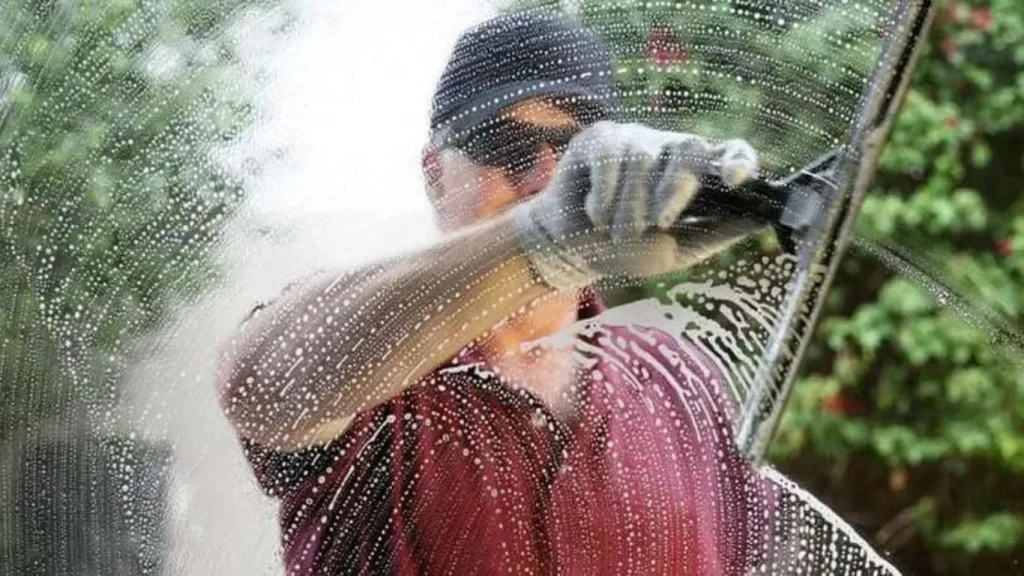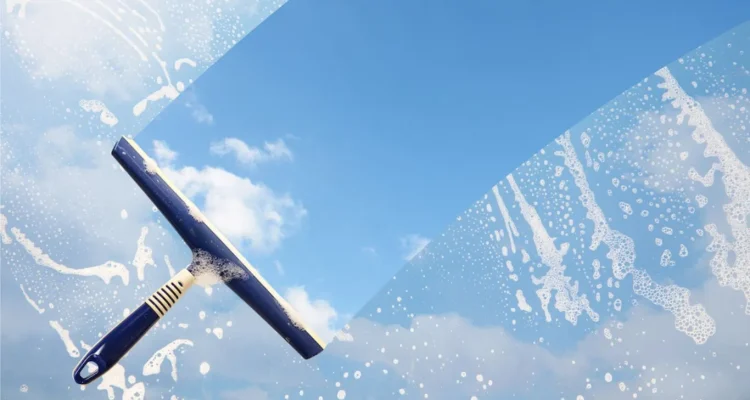Introduction
We all love sparkling clean windows, but achieving that spotless finish can be challenging. Whether it’s the stubborn streaks or the hard-to-reach corners, window cleaning is often more complicated than it looks. Professional window cleaners, however, make it seem effortless. So, what do they use to get those pristine results? Let’s dive into the tools, techniques, and secrets of professional window cleaners.

Tools and Equipment Used by Professional Window Cleaners
Squeegees
Squeegees are the cornerstone of professional window cleaning. These simple yet effective tools help remove water and cleaning solution from the glass, leaving it streak-free.
Types of Squeegees
Professional window cleaners often use high-quality squeegees with replaceable rubber blades. There are various types of squeegees, including handheld and extension pole squeegees, which help reach higher windows without a ladder.
How to Use a Squeegee Properly
Using a squeegee properly involves a technique called the “S-pattern.” Starting at the top corner of the window, you move the squeegee in an S-shape, covering the entire surface. This method ensures even pressure and prevents streaks.
Scrubbers and Sponges
Scrubbers and sponges are essential for loosening dirt and grime before squeegeeing.
Differences Between Scrubbers and Sponges
Scrubbers, often made with a soft abrasive surface, are used to tackle tough spots without scratching the glass. Sponges, on the other hand, are ideal for applying cleaning solutions evenly.
Best Practices for Using Scrubbers and Sponges
The key to using scrubbers and sponges effectively is to ensure they are clean and damp (not soaked). This helps lift dirt without leaving excess water on the window.
Buckets
Buckets are more than just containers for water; they are designed to make the cleaning process efficient.
Features of a Good Bucket
A good window cleaning bucket is sturdy, has a large capacity, and includes compartments or clips for holding tools.
How to Set Up a Cleaning Bucket
Setting up a cleaning bucket involves filling it with a mix of water and cleaning solution, and organizing tools for easy access.
Extension Poles
Extension poles allow cleaners to reach high windows safely and efficiently.
Importance of Extension Poles
Extension poles eliminate the need for ladders in many situations, reducing the risk of falls and making the job faster.
Choosing the Right Extension Pole
When choosing an extension pole, consider the height you need to reach and the compatibility with your squeegees and scrubbers.
Cleaning Solutions and Chemicals
Commercial Window Cleaning Solutions
Professional window cleaners often use commercial-grade cleaning solutions that are specifically formulated for window cleaning.
Popular Brands
Brands like Unger, Ettore, and Windex are popular among professionals for their effectiveness and ease of use.
Benefits of Commercial Solutions
Commercial solutions are designed to cut through grime and leave a streak-free finish. They also often contain agents that repel dust and dirt.
Homemade Cleaning Solutions
Some professional window cleaners prefer homemade solutions for their simplicity and cost-effectiveness.
Common Ingredients
Common ingredients include vinegar, dish soap, and water. These household items can create an effective cleaning solution when mixed in the right proportions.
Effectiveness of Homemade Solutions
While not as potent as commercial solutions, homemade mixtures can still yield excellent results, especially for routine cleanings.
Eco-Friendly Options
Eco-friendly cleaning solutions are becoming increasingly popular among professional window cleaners.
Benefits of Eco-Friendly Solutions
These solutions are biodegradable, non-toxic, and safe for both the environment and the cleaner.
Best Eco-Friendly Products
Products like Ecover and Seventh Generation offer eco-friendly window cleaning solutions that are effective and safe.
Techniques for Professional Window Cleaning
The S-Pattern Technique
One of the most effective techniques used by professional window cleaners is the S-pattern.
Steps to Perform the S-Pattern
- Start at the top corner of the window.
- Move the squeegee in an S-shape from one side to the other.
- Wipe the squeegee blade after each pass to prevent streaks.
Advantages of the S-Pattern
This method ensures thorough coverage and reduces the chances of streaks or missed spots.
Detail Cleaning
Detail cleaning involves focusing on edges, corners, and other hard-to-reach areas.
Tools for Detail Cleaning
Detailing often requires smaller squeegees, brushes, and microfiber cloths to ensure a perfect finish.
Importance of Detail Work
Attention to detail can make the difference between a good and a great window cleaning job.
Using a T-Bar
A T-bar is a tool used to apply cleaning solution evenly across large windows.
What is a T-Bar?
A T-bar consists of a bar with a soft, absorbent cover that holds cleaning solution.
How to Use a T-Bar Effectively
To use a T-bar, dip it in the cleaning solution, and then apply it evenly across the window. This prepares the window for scrubbing and squeegeeing.
Safety Measures and Best Practices
Safety Gear
Professional window cleaners prioritize safety by using the appropriate gear.
Essential Safety Equipment
Essential safety gear includes gloves, safety glasses, and harnesses for high-rise work.
Using Safety Gear Properly
Proper use of safety gear involves regular inspection and correct fitting to ensure maximum protection.
Working at Heights
Cleaning windows at heights requires additional precautions.
Ladder Safety Tips
When using a ladder, ensure it is stable and positioned on a flat surface. Always maintain three points of contact and never overreach.
Using Scaffolding and Lifts
For higher windows, scaffolding or lifts may be necessary. These should be operated by trained professionals to ensure safety.
Weather Considerations
Weather can significantly impact window cleaning.
Cleaning Windows in Different Weather Conditions
Avoid cleaning windows in direct sunlight or during extreme temperatures, as this can cause the cleaning solution to dry too quickly, leaving streaks.
Best Times for Window Cleaning
Early morning or late afternoon are often the best times for window cleaning, as temperatures are more moderate.
Professional Window Cleaning Services
Benefits of Hiring Professionals
Hiring professional window cleaners can save time and ensure high-quality results.
Quality of Work
Professionals have the experience and tools to achieve a spotless finish that is hard to replicate with DIY methods.
Time and Effort Savings
Hiring professionals frees up your time and spares you the effort of a labor-intensive task.
How to Choose a Professional Window Cleaner
Choosing the right professional window cleaner involves considering several factors.
What to Look For
Look for licensed, insured, and experienced cleaners with good reviews.
FAQs
- What is the best way to clean windows without streaks?
- Using a squeegee with the S-pattern technique and wiping the blade after each pass is the best way to avoid streaks.
- How often should windows be professionally cleaned?
- It’s recommended to have windows professionally cleaned at least twice a year, but this can vary based on location and environmental factors.
- Are there any windows that shouldn’t be cleaned with certain solutions?
- Yes, tinted or specially coated windows may require specific cleaning solutions to avoid damage.
- Can professional window cleaners handle hard-to-reach windows?
- Yes, professional window cleaners are equipped with extension poles, ladders, and sometimes lifts to reach difficult areas.
- What is the average cost of professional window cleaning services?
- The cost can vary widely but typically ranges from $100 to $500, depending on the size and number of windows.
Conclusion
Professional window cleaners use a variety of specialized tools and techniques to achieve the perfect finish. From high-quality squeegees to eco-friendly cleaning solutions, every aspect of their process is designed for efficiency and effectiveness. By understanding what professionals use and how they work, you can achieve better results in your own window cleaning efforts or feel more confident in hiring a pro.


Congratulation!